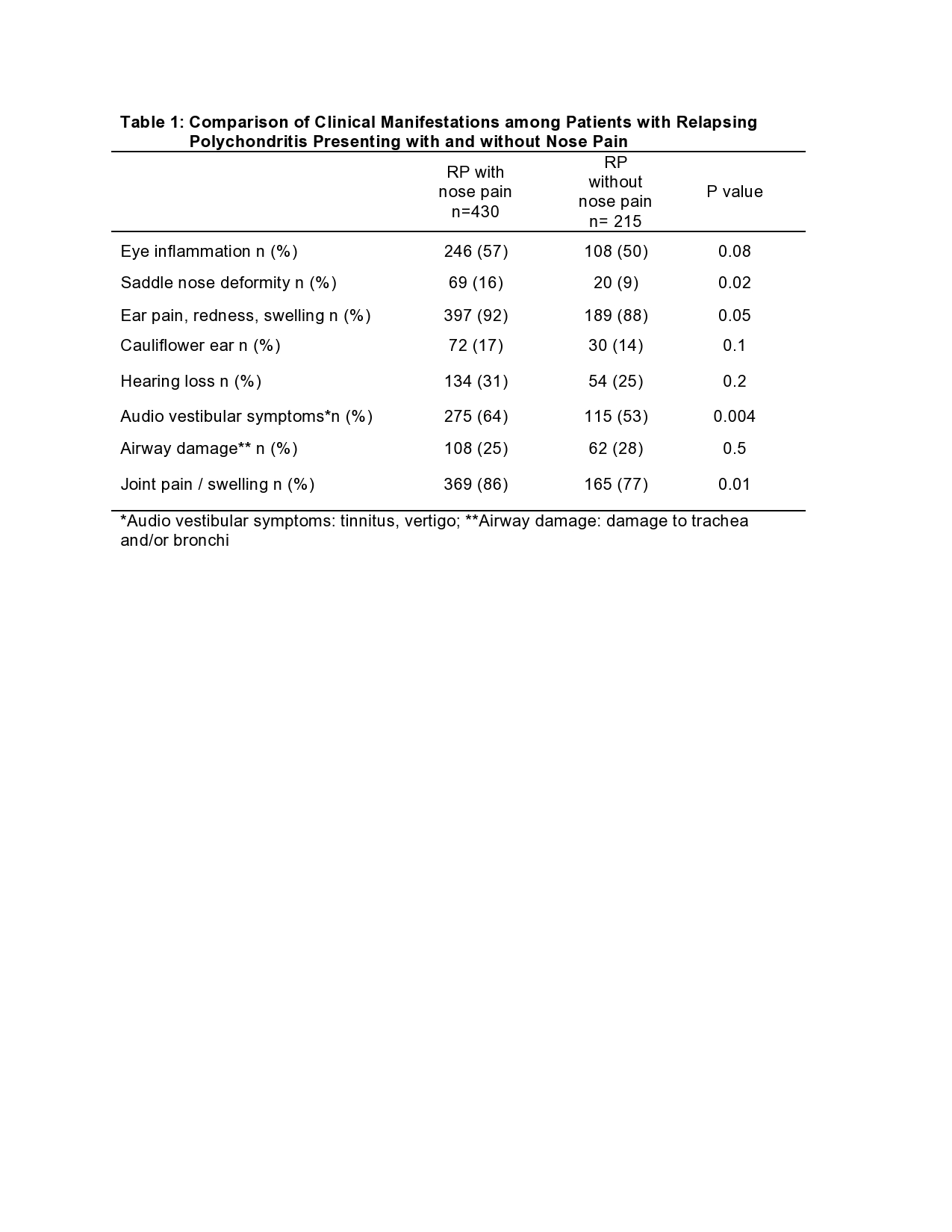Session Information
Date: Tuesday, November 9, 2021
Title: Vasculitis – Non-ANCA-Associated & Related Disorders Poster II (1862–1888)
Session Type: Poster Session D
Session Time: 8:30AM-10:30AM
Background/Purpose: Nasal chondritis is a well-recognized manifestation of relapsing polychondritis (RP), occasionally leading to saddle nose deformity. Early symptoms of nasal chondritis such as nose pain are often overlooked. The objective of this study was to characterize nose pain and identify associated symptoms reported by patients with RP.
Methods: Patients with self-reported RP were invited to participate in an online survey. Participants were asked questions about nose pain such as location, onset, duration, frequency, quality, diurnal variation, aggravating and alleviating factors, associated symptoms, and saddle nose deformity. Participants with physician-diagnosed RP, aged ≥ 18 years, who meet McAdams diagnostic criteria were included in the study. Fisher’s exact test was used to compare clinical characteristics between patients with and without nose pain.
Results: A total of 659 subjects were included, of which 484 (73%) were from the United States. The majority (n=548, 83%) identified themselves as Caucasians, and 574 (87%) were female. Mean age was 50 years (interquartile range = 41-58). Many patients (n=430, 65%) reported nose pain. RP diagnosis was commonly made by rheumatologists (n=313,73%) and otolaryngologists (101, 23%) in patients with nose pain. Compared to patients without nose pain, those with nose pain were more likely to report saddle nose deformity, audio vestibular symptoms, joint pain and swelling (Table 1). Treatment with prednisone was reported by 429 (99%) patients, of which 423 (99%) reported symptom relief with prednisone.
In patients with nose pain (n=430), pain was described as stabbing (n=147, 34%), sharp (n=73, 17%), dull (n=73, 17%), or burning (n=46, 10%); majority (n=313, 73%) reported at least two types of pain and (n=137, 32%) did not report a pain descriptor. Associated nasal pressure (n=150, 34%), tingling (n=119, 27%), or throbbing (n=61, 14%) was reported. Factors felt to aggravate nose pain were minimal trauma (n=240, 55%), stress (n=210, 48%), and cold exposure (n= 104, 24%); 50% reported more than one aggravating factor. Majority (n=322, 75%) reported the pain lasted for ≥1day. Frequency of reported nasal symptoms were daily (n=65, 15%), weekly (n=73, 17%), monthly (n=83, 19%), and few times/year (n=109, 25%). Onset of pain was mostly reported as variable (n=127, 30%) or gradual (n=138, 32%). The location of pain included bridge of the nose (n=252, 58%), sides (n=171, 39%), the base (n=146, 34%), or the tip (n=134, 31%) with 275 (64%) reporting pain in at least two locations. Many patients reported nose pain during the day (n=262, 60%), some reported nighttime pain (n=169, 39%) and pain during sleep (n=108, 25%). Most common associated symptoms were redness, swelling, and congestion, each reported by 50% of patients with nose pain.
Conclusion: Most patients with RP reported a wide range of symptoms of nasal disease. Commonest nasal complaints were stabbing pain with associated redness, swelling and congestion that lasts longer than a day, involves the bridge of the nose, and is aggravated by minor trauma. Detailed assessment of nasal manifestations could be helpful for clinicians for establishing a diagnosis and monitoring disease activity.
To cite this abstract in AMA style:
Banerjee S, Linn N, costedoat-Chalumeau n, Moulis G, Merkel P, Grayson P, Ferrada M. Characterization of Symptoms of Nasal Disease in Relapsing Polychondritis Using Patient-Reported Data [abstract]. Arthritis Rheumatol. 2021; 73 (suppl 9). https://acrabstracts.org/abstract/characterization-of-symptoms-of-nasal-disease-in-relapsing-polychondritis-using-patient-reported-data/. Accessed .« Back to ACR Convergence 2021
ACR Meeting Abstracts - https://acrabstracts.org/abstract/characterization-of-symptoms-of-nasal-disease-in-relapsing-polychondritis-using-patient-reported-data/

